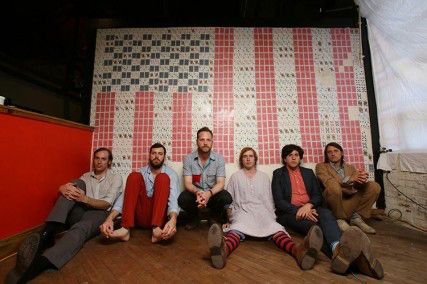
Childhood friends Toby Leaman and Scott McMicken form the crux of Dr. Dog, a rock band from West Grove, Pa. Others members have come and gone, but the two have remained constants, sharing vocal duties and songwriting credits throughout the band’s evolution from their 2001 debut Psychedelic Swamp to 2013’s B-Room. While the former album is a mishmash of lo-fi sounds to be decoded by aliens, the latter is a soulful jaunt with sophisticated harmonies and a throwback sound created by a tight-knit unit of six.
While the hard-to-find Psychedelic Swamp sounds like an experiment in musical Dadaism, Dr. Dog’s follow up albums have had more direction. The band’s third record, 2005’s Easy Beat, signifies the moment where Dr. Dog successfully melded their lo-fi psychedelic sensibilities with their love for blues and harmonies.
Dr. Dog’s few following albums had a similar hodgepodge of sound effects, blues and Beatles-esque harmonies before 2010’s Shame, Shame. The release of Shame marked a change for the band as they smoothed the rough edges and increased their production values. Each successive Dr. Dog album is more polished than the last, but even with the studio shine Dr. Dog sticks true to their bluesy roots while expanding their sound.
The Daily Free Press spoke to the raspy-voiced Leaman last week in a phone interview in preparation for the band’s show at House of Blues Thursday night. Even through phone lines, Leaman came off as a good-humored guy who would enthusiastically talk about music for hours if left to his own devices.
So how does Leaman feel about Dr. Dog’s growth? He admits, “I don’t think we’re quite as heavy-handed as we used to be.”
To Leaman, the early days of Dr. Dog felt like him and McMicken recording with whoever was around. These days, Dr. Dog is an established group of six musical veterans.
“It definitely feels like a band — the sort of thing we were always trying to have,” Leaman said.
Leaman said the album’s lyrical subject matter is essentially the same as it has always been: reflection.
“Not everything is about a girl,” Leaman said. “Not everything is about angst or about happiness. It’s a little more nuanced than that.”
Leaman explained that confusion has been a central theme of Dr. Dog’s music. The figures of Dr. Dog songs are “not trying to figure out the greater questions” but are instead simply aware that those questions exist.
While the themes may have remained the same throughout Dr. Dog’s musical evolution, Leaman said he thinks the writing process has improved.
“Lyrically, we’re way better,” Leaman said.
Similarly, Leaman said he is impressed with the singing on the band’s latest album, saying that the leads have never sounded better.
One of the band’s marked differences is a shift toward recording songs entirely live in the studio. That’s not to say the band didn’t record vocals separately or overdub obvious mistakes, but they tried to record as many instruments as they could in the same take. While complex recording sessions were Dr. Dog’s “bread and butter for about 10 years,” Leaman and Dr. Dog have aspired to meld the divide between their studio and live show sounds with their latest recordings.
Dr. Dog recorded their latest album B-Room in their new studio located in the suburbs of Philadelphia. What was once a mill is now a recording studio with eight rooms and a place to stay overnight — a step-up from their last place. The B-Room, one of the many rooms in the band’s spacious new studio, was the inspiration for the 2013 album title. Leaman said it’s a “conducive place to either do nothing or get a lot done.” He said band members could go in there for 16 hours and come out with what they needed without having bothered anybody or without “overly embarrassing yourself by messing up 20 billion times.”
Leaman also explained that space is “integral for how you feel” especially considering how long it takes Dr. Dog to make records.
“When you’re spending that much time in a space … the space has to be awesome or you’re just going to feel like s**t and your record is going to suffer,” he said. “You’re going to be miserable.”
Leaman said Dr. Dog’s old studio is a perfect example. After a long night of recording, Leaman would wake up to the sound of other musicians.
“You felt so horrible because…you stayed up all night and recorded and got s**t done…but then waking up in the same junky, trashy place with no shower and no real food…a shared bathroom out in the hallway,” Leaman said. “If you stayed there two or three nights in a row, you were pretty dead… You needed to get the hell away from that spot to keep your sanity.”
However, when talking about Dr. Dog’s latest record, Leaman said, “I don’t know the next time I’ll listen to this record.”
The vocals are better than ever, the lyrics are in tip-top shape and the band is closer to capturing its live essence in studio recordings than ever before. So why won’t Leaman listen to the damn thing?
“It’s a weird thing, too, because you listen to it so much and you love it so much and then you’re done,” he explained. “And then you listen to it some more times and you feel real satisfied and proud. And then it becomes painful to listen to.”
It’s not any indication of his displeasure with the album, but rather something all artists go through. Leaman suggests that when Dr. Dog puts out five more records, his “minute” problems with the record won’t even occur to him. The further you get away from something you have created, he said, the more you’re able to accept it.






















































































































